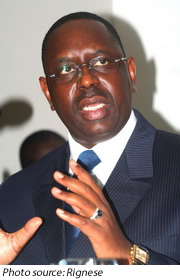
Senegal Ready for GMOs, Says President Macky Sall
April 6, 2017| |
 The President of the Republic of Senegal, H.E. Macky Sall has made it clear that he strongly supports the adoption of biotechnology in the country provided necessary biosafety measures are taken. "I must say very clearly that I am for the use of GMOs in addressing our food security needs, so long as the necessary biosafety measures are put in place. Otherwise, we would be against progress, we must decide and step forward, '' said the President.
The President of the Republic of Senegal, H.E. Macky Sall has made it clear that he strongly supports the adoption of biotechnology in the country provided necessary biosafety measures are taken. "I must say very clearly that I am for the use of GMOs in addressing our food security needs, so long as the necessary biosafety measures are put in place. Otherwise, we would be against progress, we must decide and step forward, '' said the President.
President Sall chaired the 2017 Annual Session of the Senegal National Scientific and Technical Academy (ANSTS) last month, aimed to present updates on the status, implications and perspectives of GMOs in Senegal. "Our new strategy for economic and social development is based on science and technology, which is essential for the progress and well-being of our people," he said. The President added that it is in this view that he sought informed opinion of the Academy on GMOs, which he observed, remains an important development issue.
While acknowledging that GMOs can help meet current challenges such as food insecurity, public health issues, environment conservation and climate change, he agreed with the ANSTS call to revise the biosafety regulations. "The precautionary principle must not lead to inertia. There is need to amend the 2011 law regulating biotechnology," he said. The President instructed the Minister for Environment to speed up the revision of Senegal's Biosafety Law.
The Vice-Chair of the Academy, Prof. Yaye Kene Gassama, presented the findings of a study carried out by the institution on the opportunities and risks for adopting biotechnology in Senegal at the session. Based on the study, 68% of the population in the country supported the adoption of GMOs, 21% were against and 11% had no expressed opinion. It is scientifically proven by reputable international institutions that GMOs are safe for food and feed as long as necessary biosafety measures are taken to minimize any potential environmental risks. The Session also provided an opportunity for the regional office of the New Partnership for Africa's Development agency-African Biosafety Network of Expertise in Dakar to access up-to-date information on the status of biotechnology and scientific research as well as meet members of the scientific community and decision makers of the country.
For more information on the event and biosafety trends in Africa contact Dr. Jeremy Ouedraogo, Director NEPAD-ABNE at jt.ouedraogo@nepadbiosafety.net.
| |
Biotech Updates is a weekly newsletter of ISAAA, a not-for-profit organization. It is distributed for free to over 22,000 subscribers worldwide to inform them about the key developments in biosciences, especially in biotechnology. Your support will help us in our mission to feed the world with knowledge. You can help by donating as little as $10.
-
See more articles:
-
News from Around the World
- Parliamentary Journalists Support Dialogue on the Biotech and Biosafety Bill Passage in Uganda
- Kenyan Youth Farmers Call for Adoption of WEMA Bt Maize
- Senegal Ready for GMOs, Says President Macky Sall
- Researchers Reveal Family Tree of Microorganisms Responsible for Photosynthesis
- Survey Reveals 90% of Rural Producers in Brazil Recognize Importance of Biotechnology
- Scientists Develop GE Rice that Flower on Demand
- Oxford University Starts Research on Marijuana
-
Research Highlights
- Chitinase Gene Confers Enhanced Resistance Against Rice Sheath Blight
- Gm1-MMP Enhances Tolerance to High Temperature and Humidity in Arabidopsis
-
Beyond Crop Biotech
- USDA Scientists Use Biotech Tools to Improve Guayule Plant As Natural Source of Tire Rubber
- Overexpression of AtSHN1 in Mulberry Reduces Postharvest Water Loss in Leaves
-
Resources
- The Petri Dish is Now Online
- Are GMOs Good or Bad? Genetic Engineering & Our Food
-
Plant
- Rapid Breeding of Parthenocarpic Tomato using CRISPR-Cas9
- CRISPR-Cas9 and -Cpf1-mediated Editing of the Stomatal Development Gene in Rice
-
Read the latest: - Biotech Updates (April 17, 2024)
- Gene Editing Supplement (April 10, 2024)
- Gene Drive Supplement (February 22, 2023)
-
Subscribe to BU: - Share
- Tweet
